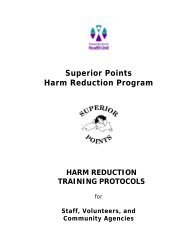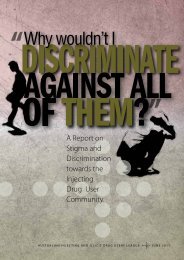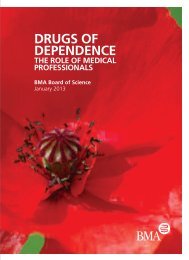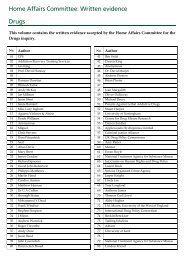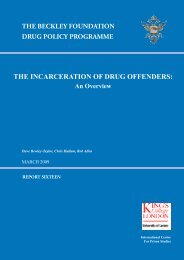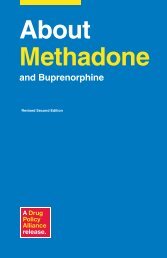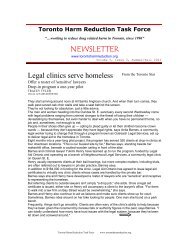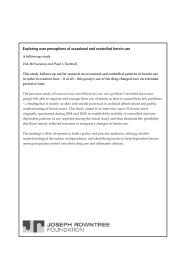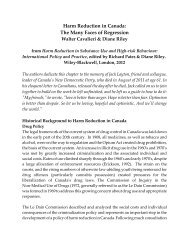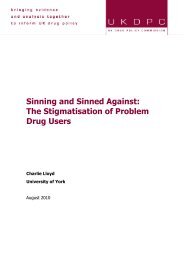Ending the Drug War - Law Enforcement Against Prohibition
Ending the Drug War - Law Enforcement Against Prohibition
Ending the Drug War - Law Enforcement Against Prohibition
Create successful ePaper yourself
Turn your PDF publications into a flip-book with our unique Google optimized e-Paper software.
About <strong>Law</strong> <strong>Enforcement</strong> <strong>Against</strong> <strong>Prohibition</strong> (LEAP)LEAP is made up of current and former police, prosecutors, judges,FBI/DEA agents, corrections officials, military officers and o<strong>the</strong>rswho fought on <strong>the</strong> front lines of <strong>the</strong> “war on drugs” and who knowfirsthand that prohibition only worsens drug addiction and illicitdrug market violence. Including our civilian supporters, LEAPrepresents more than 40,000 people in more than 80 countries.Please consider joining us and helping us to achieve our goals:1) to educate <strong>the</strong> public, <strong>the</strong> media and policy makers about <strong>the</strong>failure of current policies, and 2) to restore <strong>the</strong> public’s respect forpolice, which has been greatly diminished by law enforcement’sinvolvement in enforcing drug prohibition.www.CopsSayLegalize<strong>Drug</strong>s.com
Executive SummaryPresident Richard Nixon officially declared a war ondrugs on June 17, 1971. Thirty-eight years later, onMay 14, 2009, <strong>the</strong> Obama administration’s drug czar,Gil Kerlikowske, matter-of-factly declared during anewspaper interview that he was ending <strong>the</strong> analogyof <strong>the</strong> “war on drugs”. But this wording change and<strong>the</strong> Obama administration’s many subsequent changesin verbiage have had no corresponding significantchange in policy from that of <strong>the</strong> Bush administration.This report details <strong>the</strong> ongoing carnage resulting fromour failed prohibition policy while <strong>the</strong> administrationhas simultaneously tried to score political pointsby adopting <strong>the</strong> rhetoric of an evidence-based policy.Nowhere is <strong>the</strong> contrast between President Obama’sspoken words and policy toward drugs clearer than in<strong>the</strong> comparison between spending for punishment andinterdiction (supply reduction) and spending forprevention, treatment and o<strong>the</strong>r health approaches (demandreduction). Despite President Obama’s clear -- andpolitically popular -- statement that “we have to thinkmore about drugs as a public-health problem,” his administration’sbudgets request funding for punishmentat a much higher level than for treatment and prevention.Similarly, <strong>the</strong> Obama administration has tried to convince<strong>the</strong> public that it supports states’ rights to enactmedical marijuana laws while actually underminingsuch efforts at nearly every turn. The Obama administrationgave great fanfare to an October 2009 memo suggestingthat those in compliance with state law shouldnot be prosecuted, leaking it to <strong>the</strong> press late on a Sundaynight to ensure heavy media coverage. However,<strong>the</strong> rate of raids on medical marijuana providers during<strong>the</strong> Obama administration has actually increased since<strong>the</strong> Bush administration. Tellingly, <strong>the</strong> administrationhas done nothing to trumpet <strong>the</strong>se raids to <strong>the</strong> press.While <strong>the</strong> rates of drug-war-related deaths in Mexicoskyrocket, <strong>the</strong> Obama administration continues to providefinancial assistance to Mexico’s crackdown on drugcartels, like <strong>the</strong> Bush administration before it. Perversely,high-ranking Obama administration officials likeDEA head Michele Leonhart have even described <strong>the</strong>increase in <strong>the</strong>se grizzly killings as a sign of <strong>the</strong> successof prohibition. The Obama administration continuesto fund Mexico’s war on drugs even as <strong>the</strong> killings increasefaster each year (e.g. a 40% rise in killings from2008 to 2009 and a nearly 60% rise from 2009 to 2010).Meanwhile, as <strong>the</strong> Obama administration tries to ignoreit, <strong>the</strong> drug war continues to cause widespreadgang violence within our own borders, in additionto spillover cartel violence from Mexico. When ajournalist asked U.S. Attorney General Eric Holderwhe<strong>the</strong>r he thought ending <strong>the</strong> war on drugswould prevent <strong>the</strong> fur<strong>the</strong>r loss of police officers’ livesin drug enforcement actions, he simply replied, “Idon’t think that’s right…no” and <strong>the</strong>n walked away.The Obama administration does deserve credit for atleast recognizing that <strong>the</strong> American people are readyfor fundamental changes to drug policy and that antidrug-warrhetoric is a shrewd political move. Fully 76%of <strong>the</strong> American people and 67% of chiefs of police havedeclared <strong>the</strong> drug war a failure, according to polls. Theadministration also deserves some credit for enactinga small number of sensible changes in domesticdrug policy, including lifting <strong>the</strong> ban on using federalfunding for syringe exchange and reducing <strong>the</strong> disparitybetween sentences for crack and powder cocaine.But as <strong>the</strong> Obama administration’s policies largely lagbehind its rhetoric, state governments and prominentindividuals are leading <strong>the</strong> way to reform. As ofthis writing, 16 states plus <strong>the</strong> District of Columbiahave laws on <strong>the</strong> books making medical marijuanalegal for those with doctors’ recommendations, and14 states have decriminalized possession of smallamounts of marijuana. In 2012, several state ballotsare expected to feature initiatives to legalize andregulate marijuana. A growing number of prominentorganizations and individuals including <strong>the</strong> formerpresidents of several countries, former UN secretarygeneral Kofi Annan and o<strong>the</strong>r world leaders, have allcome out publicly to suggest a change in <strong>the</strong> failedwar on drugs. Let’s hope that <strong>the</strong> Obama administration’spolicies catch up to its rhetoric before it’s too late.
“We are notat war withpeople inthis country.”- WhiteHouse <strong>Drug</strong>Czar Gil KerlikowskeIntroductionPresident Richard Nixon officiallydeclared a war on drugs in a messageto Congress on June 17, 1971.Thirty-eight years later, on May14, 2009, <strong>the</strong> Obama administration’sdrug czar, Gil Kerlikowske,matter-of-factly declared during anewspaper interview that he wasending <strong>the</strong> war on drugs.“Since I used to stand in front of<strong>the</strong> helicopter for President Nixonwho brought <strong>the</strong> term in vogue,”Kerlikowske told <strong>the</strong> Wall StreetJournal, “it’s fitting that I’m almostback in <strong>the</strong> same spot and trying toput an end to <strong>the</strong> war analogy.”But despite <strong>the</strong> drug czar’s declaration,<strong>the</strong> war on drugs is still beingwaged, more vigorously than ever.Using <strong>the</strong> federal government’sown data and o<strong>the</strong>r sources, thisreport details <strong>the</strong> ongoing carnagebeing caused by a prohibitionpolicy <strong>the</strong> Obama administrationseems to pretend no longer exists.Handcuffs for Health Problems?In contrast to President Obama’sadmission that “we have to thinkmore about drugs as a publichealthproblem,” his drug controlbudget requests continue a Busheraratio that funds punishmentoriented(supply reduction) pro-65.0%Figure 1. Supply Reduction VersusDemand Reduction BudgetsPercentage of Total60.0%55.0%50.0%45.0%40.0%35.0%Supply ReductionDemand ReductionSource: U.S. Office of National <strong>Drug</strong> Control Policy. (April 2011). FY2012 Budget and Performance Summary.http://www.whitehousedrugpolicy.gov/publications/policy/12budget/fy12_budget_summary.pdf6
Millions2.001.801.601.401.201.000.800.600.400.200.00Figure 2. Yearly <strong>Drug</strong> Arrests1999 2000 2001 2002 2003 2004 2005 2006 2007 2008 2009Source: U.S. Department of Justice, Federal Bureau of Investigation. (2000-2010). Crime in <strong>the</strong> United States.http://www.fbi.gov/about-us/cjis/ucr/ucrgrams at a much higher rate thanhealth-oriented (demand reduction)strategies. If <strong>the</strong> president reallythinks we need to move awayfrom punitive, war-like approachesto <strong>the</strong> health issue of drug abuse,why, for example, did his first drugcontrol budget with his new drugczar in place (FY 2011) include a13% increase in anti-drug spendingfor <strong>the</strong> Department of Defense,an 18% increase in <strong>the</strong> Bureau ofPrisons drug control funds and a34% percent decrease in supportfor anti-drug programs under <strong>the</strong>Department of Education, as comparedto President Bush’s budgetfrom FY 2009?¹In light of President Nixon’s coining<strong>the</strong> phrase “war on drugs,” mostpeople assume that he presidedover a harsh, punishment-orienteddrug control strategy. But hisdrug control budgets, unlike thoseof subsequent presidents, actuallyemphasized funding for health solutionsto problems of drug abuseover punishment strategies.For example, along with <strong>the</strong> original1971 declaration of war againstdrugs, President Nixon requestedthat Congress appropriate $155million in new anti-drug funds,with more than two-thirds of itearmarked solely for treatmentand rehabilitation.²The differences in how <strong>the</strong> Nixonand Obama administrations havepublicly discussed <strong>the</strong>ir drug con-7
“I understand,fromfirsthandexperienceas a policeofficer andpolice chief,that we cannotarrest orincarcerateour way outof a problemthis complex,andthat a ‘<strong>War</strong>on <strong>Drug</strong>s’mentality istoo simplisticanapproach tobe effective.”- WhiteHouse <strong>Drug</strong>Czar Gil Kerlikowsketrol strategies show just how much<strong>the</strong> political dynamics surroundingdrug policy have changed over<strong>the</strong> years. While <strong>the</strong> Nixon administration’spublic messaging carefullystressed punishment, it directedresources primarily towardpublic health. Today, <strong>the</strong> Obamaadministration’s press releasesemphasize public health whileits funding requests are actuallyweighted toward punishment.In adopting talking points abouttreating drug abuse as a healthproblem, <strong>the</strong> Obama administrationhas been able to score politicalpoints with <strong>the</strong> three-quartersof Americans who have come torealize that <strong>the</strong> war on drugs is afailure, yet few journalists havereported that <strong>the</strong> budget realitydoesn’t match <strong>the</strong> rhetoric.³In deed, if not in word, PresidentObama has presided over a war ondrugs that has been waged at a ratevirtually indistinguishable fromthat of his recent predecessors. Forexample, <strong>the</strong> latest available federaldata shows that drug arrestsduring President Obama’s firstyear in office are up compared tothose during <strong>the</strong> first year of PresidentBush’s administration. Fundamentally,<strong>the</strong> arrest rate hasn’tchanged significantly despite <strong>the</strong>White House’s own admission thatwe cannot “arrest or incarcerateour way out of a problem this complex.”If <strong>the</strong> administration sincerely believes<strong>the</strong> same old drug war approachis not going to solve drugabuse problems, <strong>the</strong>n it needs tomatch its words to its deeds andactually shift limited resourcesaway from programs that can neverwork towards programs thatcan.Waging <strong>War</strong> <strong>Against</strong> Seriously IllIn similar fashion, <strong>the</strong> Obama administrationhas tried to convince<strong>the</strong> public that it supports states’rights to enact medical marijuanalaws while actually underminingsuch efforts at nearly everyturn. Despite reassurances that acash-strapped federal governmentwould not waste its limited resourcesattacking legitimate, stateapprovedmedical marijuana providers,<strong>the</strong> rate of raids on thosecompassion centers has actuallyincreased during this administration.Notwithstanding an October 2009Department of Justice memorandumthat supposedly de-emphasizedfederal interference inmedical marijuana states, Obamaadministration officials have thusfar carried out nearly 100 raidson patients, growers, compassion8
centers and testing facilities in states wheremedical marijuana is legal. In comparison,Justice Department officials under <strong>the</strong> Bushadministration conducted just over 200 suchraids over <strong>the</strong> course of two entire presidentialterms.⁴But <strong>the</strong> Obama administration would ra<strong>the</strong>rvoters not think of it as anti-medical marijuana.Knowing that its supposed non-interferencemedical marijuana policy wouldplay well with <strong>the</strong> over 80 percent of <strong>the</strong>American public that supports medicalmarijuana, White House officials leaked <strong>the</strong>Justice Department memo to <strong>the</strong> AssociatedPress late on a Sunday night, ensuring that<strong>the</strong> story would be heavily emphasized during<strong>the</strong> beginning of <strong>the</strong> week’s news cycle.⁵Tellingly, White House officials give no suchfanfare to anti-medical marijuana moves by<strong>the</strong> Justice Department. For example, <strong>the</strong>yhave done nothing to trumpet threat lettersthat U.S. attorneys have issued to severalstate officials who are weighing approval ofmedical marijuana compassion centers.If President Obama is serious about hiscampaign pledge that “it’s not a good useof our resources” to crack down on medicalmarijuana patients and providers, he needsto reign in <strong>the</strong>se U.S. attorneys and DEA officialswho insist on spending scarce taxpayerresources to interfere with <strong>the</strong> effectiveimplementation of state medical marijuanalaws.Deadly <strong>War</strong> South of <strong>the</strong> BorderOne of <strong>the</strong> ugliest signs of <strong>the</strong> failure of <strong>the</strong>war on drugs is <strong>the</strong> wildly escalating rate ofObama’s Good Medical Marijuana PressObama Justice Department to Shift FromInvestigating Medical Marijuana CasesU.S. Won’t Prosecute in States ThatAllow Medical MarijuanaMajor Blow to ‘<strong>War</strong> on <strong>Drug</strong>s’: Obama Tells FedProsecutors, Don’t Waste Your Time with MedicalMarijuana ArrestsU.S. Relaxes Opposition to Medical MarijuanaDon’t Prosecute Medical-Marijuana Use, ObamaAdministration SaysHeadlines Obscure <strong>the</strong> Real StoryWhen Rhode Island first enacted its medical marijuanalaw in 2006, it was a relief to people like GeorgeDesRoches, who uses marijuana to alleviate <strong>the</strong> extremepain he suffers due to fibromyalgia. But whileRhode Island’s initial law protected him from arrest,it didn’t provide a safe and regulated means by whichhe could obtain his doctor-recommended medicine.So, like many o<strong>the</strong>rs, he turned to <strong>the</strong> black market.Once, while attempting to purchase marijuanaon <strong>the</strong> street, he was robbed at gunpoint.After hearing stories like George’s, Rhode Islandlawmakers expanded <strong>the</strong> state’s medical marijuanapolicy in 2009 to create state-licensed compassioncenters, where patients can go to purchase <strong>the</strong>irmedicine in a safe and above-ground environment.The state was set to license three such compassioncenters this summer. That is, until U.S. attorney PeterNeronha sent a letter to Gov. Lincoln Chafee this Aprilthreatening federal law enforcement action should <strong>the</strong>state move forward with its plan to open <strong>the</strong> centers.Bowing to <strong>the</strong>se Obama administration threats,<strong>the</strong> governor suspended <strong>the</strong> compassion centerprogram, leaving patients like George tofend for <strong>the</strong>mselves on <strong>the</strong> black market just toobtain <strong>the</strong>ir doctor-recommended medicine.Anyone who thinks President Obama has ushered ina new era of compassion, science-based policy andrespecting states’ rights to enact medical marijuanalaws needs to have a chat with patients like George.9
illegal drug trade murders in Mexico.Since Mexican President FelipeCalderon launched an offensiveagainst drug cartels shortly aftertaking office in late 2006, nearly40,000 people have been killed inattacks that <strong>the</strong> media calls “drugviolence,” but which are in fact<strong>the</strong> predictable turf battles thataccompany <strong>the</strong> policy of prohibition.The tally of dead of course includescartel members <strong>the</strong>mselves,but an alarming number of <strong>the</strong>fallen are police officers and civilianbystanders as well as some U.S.citizens.⁶The Obama administration, like<strong>the</strong> Bush administration before it,has provided financial assistancefor President Calderon’s militarizedapproach through <strong>the</strong> so-called “Merida Initiative,” a multibillion-dollarsupport package thatsupplies <strong>the</strong> Mexican governmentwith money to purchase helicopters,surveillance and scanningtechnologies and o<strong>the</strong>r endlesslyexpensive paraphernalia requiredby <strong>the</strong> war on drugs.But as <strong>the</strong> aid has been delivered,<strong>the</strong> death rates have only risen,with 15,273 losing <strong>the</strong>ir lives in2010 alone, a 60 percent increasefrom 2009.⁷Perversely, high-ranking Obamaadministration officials have evendescribed <strong>the</strong> increase in <strong>the</strong>segrizzly killings as a sign of successof prohibition. “It may seemcontradictory, but <strong>the</strong> unfortunatelevel of violence is a sign of successFigure 3. <strong>Drug</strong> <strong>War</strong> Killings in MexicoSince Launch of President Calderon'sOffensive on <strong>Drug</strong> Cartels16,00014,00012,00010,0008,0006,0004,0002,00002006 2007 2008 2009 2010Source: BBC. (January 2011). Crunching Numbers in Mexico’s <strong>Drug</strong> Conflict.http://www.bbc.co.uk/news/world-latin-america-1219413810
in <strong>the</strong> fight against drugs,” said MicheleLeonhart, who served as actingadministrator of <strong>the</strong> <strong>Drug</strong> <strong>Enforcement</strong>Administration underPresident Bush and whom PresidentObama nominated for <strong>the</strong>administrator job in early 2010.While it is true that many killingsoccur after cartel leaders arebrought to justice and <strong>the</strong>ir underlingsbattle it out to fill <strong>the</strong>power vacuum created by <strong>the</strong> arrests,officials like Leonhart refuseto acknowledge that this is acycle that cannot and will not enduntil prohibition itself ends. Aslong as drugs remain illegal andthus incredibly lucrative on <strong>the</strong>black market, <strong>the</strong>re will always bemore people willing to step up andrisk death or imprisonment for achance at making riches in <strong>the</strong> undergroundmarket.Blood on American StreetsAccording to <strong>the</strong> Department ofJustice, <strong>the</strong> illegal drug market in<strong>the</strong> U.S. is dominated by 900,000criminally active gang membersaffiliated with 20,000 street gangsthat have set up shop in more than2,500 cities across <strong>the</strong> country.⁸It seems every week <strong>the</strong>re are reportsof drive-by shootings andbattles over drug turf between<strong>the</strong>se gang members as <strong>the</strong>y fightfor control of <strong>the</strong> lucrative illegaltrade. But unlike Mexico, <strong>the</strong> U.S.government makes no attempt totally those killed in domestic drugwar battles on our streets.An additional officially-untoldnumber of people lose <strong>the</strong>ir livesin police raids gone wrong duringwhich cops are killed by suspectsor vice versa. This year <strong>the</strong> organizationStopThe<strong>Drug</strong><strong>War</strong>.org hasbegun tallying <strong>the</strong> number of policeofficers and citizens killed insuch law enforcement actions. Asof June 6, four police officers and25 civilians have lost <strong>the</strong>ir lives sofar in 2011.⁹But <strong>the</strong> Obama administrationseems to want to pretend <strong>the</strong>sekillings aren’t happening. Whena journalist asked U.S. AttorneyGeneral Eric Holder whe<strong>the</strong>r hethought ending <strong>the</strong> war on drugswould prevent <strong>the</strong> fur<strong>the</strong>r loss ofpolice officers’ lives in drug enforcementactions, he simply replied“I don’t think that’s right…no” and <strong>the</strong>n walked away.¹⁰It is unconscionable that <strong>the</strong> U.S.government can’t be bo<strong>the</strong>redwith tracking how many Americansare losing <strong>the</strong>ir lives as aresult of our failed drug policies– especially when <strong>the</strong> Mexicangovernment has shown that suchtabulation is possible.“It may seemcontradictory,but <strong>the</strong>unfortunatelevel of violenceis asign ofsuccess in <strong>the</strong>fight againstdrugs.”- MicheleLeonhart,Administrator,<strong>Drug</strong><strong>Enforcement</strong>Administration11
And, <strong>the</strong> violence and kidnappingsperpetrated by Mexican cartelshave crept over into <strong>the</strong> U.S. TheDepartment of Justice says thatMexican drug cartels now directlycontrol illegal drug markets in atleast 230 American cities.¹¹<strong>Law</strong> <strong>Enforcement</strong> in <strong>the</strong> <strong>Drug</strong> <strong>War</strong> Line of FireToo many tragic law enforcer deaths needlessly resultfrom a policy that charges police with enforcing an unwinnablewar on drugs.One such tragedy was <strong>the</strong> death of U.S. Marshal DerekHotsinpiller of West Virginia who was killed this Februarywhen a drug suspect opened fire on him and two o<strong>the</strong>rmarshals during a police raid in Elkins, West Virginia.The marshals were serving a warrant on Charles E.Smith, who was wanted on charges related to possessionwith intent to distribute cocaine. Immediately uponentering <strong>the</strong> residence, all three of <strong>the</strong> marshals werefired upon and struck by Smith. The marshals returnedfire on Smith and he was shot dead on <strong>the</strong> scene. Derek,who was shot in <strong>the</strong> neck, was pronounced dead at a localhospital. He was just 24 years old.Derek came from a law enforcement family. His late fa<strong>the</strong>rwas a lieutenant and his bro<strong>the</strong>r was a detective for<strong>the</strong> police force in Bridgeport, W.V. He graduated from<strong>the</strong> U.S. Marshals Academy on April 23, 2010.“Derek was one of our own. He was one of our best. Andhe will be missed,” said U.S. Attorney General Eric Holder.“He was a young man with big plans and unlimitedpotential.”Police make great sacrifices and put <strong>the</strong>ir lives at risk tokeep our communities safe. Asking <strong>the</strong>m to wage a warthat is unwinnable no matter how much talent, commitment,and resources we dedicate is asking <strong>the</strong>m to completean impossible task. How many more must lose <strong>the</strong>irlives before we change our disastrous policy?If drugs were legal and regulated,<strong>the</strong> financial incentives for sellingdrugs on <strong>the</strong> black market – and<strong>the</strong> violent turf battles that are aninherent part of <strong>the</strong> illegal trade– would disappear. After all, Budweiserand Coors distributors neverget into gun fights over marketshare in <strong>the</strong> now-legal market foralcohol, while <strong>the</strong> gangsters whoonce controlled <strong>the</strong> illegal prohibition-eramarket for booze oftendid – to deadly effect.Credit Where Credit is DueDespite a glaring failure to lead<strong>the</strong> way toward significant reform,<strong>the</strong> Obama administration’s rhetoricdoes at least recognize that <strong>the</strong>American people are ready forfundamental changes to drug policy.When Obama said during hiscampaign that <strong>the</strong> war on drugs isa failure, he was making a shrewdpolitical move – not going out ona limb. Fully 76% of <strong>the</strong> Americanpeople and 67% of chiefs of policehave declared <strong>the</strong> drug war a failure,according to polls.¹² , ¹³12
The administration also deservescredit for enacting a small numberof sensible changes in drugpolicy. While not game-changing,reforms like lifting <strong>the</strong> ban on usingfederal funding for syringe exchangeand reducing <strong>the</strong> disparitybetween sentences for crack andpowder cocaine signal that it is nolonger considered politically toxicto reform such obviously faileddrug policies, perhaps encouraging<strong>the</strong> even more fundamental reformsthat are underway in severalstates.The puzzling thing about Obama’sapproach is how much it acknowledgesyet lags behind <strong>the</strong> public’swidespread desire for drug policyreform. In today’s political landscape,many policymakers areincreasingly rejecting arrest anderadication in favor of an approachbased on public health, sound science,fiscal restraint and personalfreedom.States Leading <strong>the</strong> WayAs of this writing, 16 states plus <strong>the</strong>District of Columbia have laws on<strong>the</strong> books making medical marijuanalegal for those with doctors’recommendations, with three havingpassed <strong>the</strong>ir laws since 2009.Fourteen states have simply decriminalizedpossession of smallamounts of marijuana, while o<strong>the</strong>rs– like Rhode Island – have agood chance of passing such legislationthis year.In November 2010, Californiacame close to legalizing and regulatingmarijuana sales outrightthrough Proposition 19. While <strong>the</strong>measure didn’t pass, it did bringin 46.5 percent of <strong>the</strong> vote, springboarding<strong>the</strong> issue of legalizationonto <strong>the</strong> table for serious discussionacross <strong>the</strong> U.S. and globally.It is likely that initiatives to legalizeuse and sales of marijuana foradults will appear on several stateballots in 2012, most likely in Californiaand Colorado.A growing number of prominentindividuals and organizations havejumped into <strong>the</strong> pro- side of <strong>the</strong>marijuana legalization debate, including<strong>the</strong> National Black PoliceAssociation, <strong>the</strong> National LatinoOfficers Association, <strong>the</strong> CaliforniaNAACP, <strong>the</strong> Service EmployeesInternational Union of Californiaand <strong>the</strong> editorial boards ofregional daily newspapers like TheDenver Post, The Seattle Timesand The Providence Journal.Even some federal lawmakers arejoining <strong>the</strong> debate. In May, a bipartisangroup of members of <strong>the</strong> U.S.House of Representatives intro-Fully 76% of<strong>the</strong> Americanpeople and67% of chiefsof police havedeclared <strong>the</strong>drug war afailure,according topolls.13
A commissionconsistingof formerpresidents ofseveral countries,formerUN secretarygeneralKofi Annanand o<strong>the</strong>rworld leadersreleaseda report inearly Juneencouragingnations toexperimentwith modelsof legalregulation.duced three bills aimed at resolving<strong>the</strong> conflict between federaland state law with regard to medicalmarijuana, and it is widely expectedthat a full-scale marijuanalegalization bill will be introducedsoon.On <strong>the</strong> o<strong>the</strong>r side of <strong>the</strong> Capitol,Senator Jim Webb and a bipartisangroup of colleagues have beenworking to create a blue ribboncommission to study America’soverincarceration problem and topropose possible solutions. Sen.Webb has said that legalizing drugsshould be on <strong>the</strong> table for considerationby <strong>the</strong> commission.The debate is by no means limitedto <strong>the</strong> U.S. A commission consistingof former presidents of severalcountries, former UN secretarygeneral Kofi Annan and o<strong>the</strong>rworld leaders released a report inearly June encouraging nations toenact “models of legal regulationof drugs to undermine <strong>the</strong> powerof organized crime and safeguard<strong>the</strong> health and security of <strong>the</strong>ircitizens.”These are just a few examples ofhow legalization is being takenmore and more seriously and thatwe are moving towards a maturenational debate on this once taboosubject.The Price of Inaction is Too HighThe ongoing fiscal crisis at all levelsof government means, as it didduring alcohol prohibition in <strong>the</strong>midst of <strong>the</strong> Great Depression, thatpeople are going to be increasinglyintolerant of a policy that is notonly inefficient and ineffective, butremarkably costly. Harvard Universityeconomist Jeffrey Mironhas conservatively estimated thatlegalizing and regulating drugswould create $88 billion a year insavings and new revenue for U.S.federal and state governments.¹⁴Although <strong>the</strong> failure of prohibitionand <strong>the</strong> violence it causes would beunacceptable at any price, it willbe harder and harder to maintainsupport for such a policy duringwhat many are calling <strong>the</strong> “GreatRecession.”ConclusionWhile this report hasn’t pulled anypunches in pointing out where<strong>the</strong> Obama administration hasn’tmatched its deeds to its words withrespect to a real shift in <strong>the</strong> drugcontrol strategy, <strong>the</strong> fault for ourentrenched drug policies does notsolely lie with this or any particularpresident. They have all beenculpable since <strong>the</strong> cynical, manipulativebeginnings of <strong>the</strong> war on14
drugs.The real problem is <strong>the</strong> policy ofdrug prohibition itself; no less susceptibleto abuse and waste thanour parallel experiment with alcoholprohibition. That policyalso yielded unprecedented (andpredictable) rises in murders,overdose deaths, corruption anda disregard for <strong>the</strong> rule of law. Itfunded, armed and politically empowereda brutal underworld. Itdeprived hard-pressed taxpayersof fiscal relief. It did a lot of things,but it surely didn’t prevent folksfrom drinking.The real difference between <strong>the</strong>alcohol and drug prohibitions is<strong>the</strong> latter’s staying power and destructiveimpact. While America’sexperiment with banning alcohollasted only 13 years, drug prohibitionhas resulted in an average ofone million arrests each year for<strong>the</strong> past 40 years, over a trilliontax dollars spent, and millions ofworking people (disproportionatelypeople of color) denied jobclearance, student loans, publichousing, even <strong>the</strong> right to vote—allbecause of a policy which <strong>the</strong> currentadministration acknowledgesis an abject failure and claims itis ending; and yet, a policy whichpersists.The Obama administration, like atleast <strong>the</strong> two that preceded it, is ledby people who used illicit drugsand went on to have productivelives. It is a source of great shamethat none of <strong>the</strong>se presidents tookreal steps to end a policy, which, iffairly administered, would likelyhave prevented <strong>the</strong>m from enteringpolitics in <strong>the</strong> first place, letalone having access to decent jobsas <strong>the</strong>y grew up.But it is to <strong>the</strong> credit of this administrationthat <strong>the</strong>y at least occasionallyadmit <strong>the</strong> futility of <strong>the</strong>war on drugs and acknowledgethat <strong>the</strong> debate about its real andeventual end can no longer be silenced.Indeed, President Obama, in responseto a question from <strong>Law</strong><strong>Enforcement</strong> <strong>Against</strong> <strong>Prohibition</strong>speaker and retired deputy sheriffMacKenzie Allen, admitted duringa YouTube forum in January thatlegalization is “an entirely legitimatetopic for debate.”¹⁵But it is curious that he apparentlyhas not seen <strong>the</strong> disconnect betweenhis sure knowledge of prohibition’sdangerous folly and hiscontinuation of it.Our president is chasing change.He needs to catch up.“[Legalization]is anentirelylegitimatetopic fordebate.” -PresidentObama, inresponse toa questionfrom <strong>Law</strong><strong>Enforcement</strong><strong>Against</strong> <strong>Prohibition</strong>’sretireddeputysheriff MacKenzieAllen15
Endnotes¹U.S. Office of National <strong>Drug</strong> Control Policy. (May 2010). National <strong>Drug</strong> Control Strategy: FY2011 Budget Summary.http://www.whitehousedrugpolicy.gov/publications/policy/11budget/fy11budget.pdf²Nixon, Richard. (June 1971). Special Message to <strong>the</strong> Congress on <strong>Drug</strong> Abuse Prevention andControl. http://www.presidency.ucsb.edu/ws/?pid=3048#axzz1NINInQUZ³Zogby International. (October 2008). Zogby/Inter-American Dialogue Survey: Public ViewsClash with U.S. Policy on Cuba, Immigration, and <strong>Drug</strong>s.http://www.zogby.com/news/ReadNews.cfm?ID=1568⁴Americans for Safe Access. (April 2011). Pres. Obama’s Report Card on Medical Cannabis.http://americansforsafeaccess.org/downloads/Obama_Report_Card.pdf⁵ABC News/Washington Post. (January 2010). Poll: High Support for Medical Marijuana.http://abcnews.go.com/images/PollingUnit/1100a3MedicalMarijuana.pdf⁶BBC. (January 2011). Crunching Numbers in Mexico’s <strong>Drug</strong> Conflict.http://www.bbc.co.uk/news/world-latin-america-12194138⁷U.S. Senate Caucus on International Narcotics Control. (May 2011). U.S. and Mexican Responsesto Mexican <strong>Drug</strong> Trafficking Organizations.http://drugcaucus.senate.gov/Mexico-Report-Final-5-2011.pdf⁸U.S. Department of Justice. National <strong>Drug</strong> Intelligence Center. (February 2010). National<strong>Drug</strong> Threat Assessment 2010.http://www.justice.gov/ndic/pubs38/38661/38661p.pdf⁹StopThe<strong>Drug</strong><strong>War</strong>.org. (June 2011). 2011 <strong>Drug</strong> <strong>War</strong> Killings.http://stop<strong>the</strong>drugwar.org/taxonomy/term/231¹⁰<strong>Law</strong> <strong>Enforcement</strong> <strong>Against</strong> <strong>Prohibition</strong>. (May 2011). Cops Contradict Holder: Legalizing<strong>Drug</strong>s Will Save Lives. http://www.youtube.com/watch?v=EGEqIXEcnmU¹¹U.S. Department of Justice. National <strong>Drug</strong> Intelligence Center. (December 2008). National<strong>Drug</strong> Threat Assessment 2009.http://www.usdoj.gov/ndic/pubs31/31379/dtos.htm#Top¹²Zogby International. (October 2008). Zogby/Inter-American Dialogue Survey: Public ViewsClash with U.S. Policy on Cuba, Immigration, and <strong>Drug</strong>s.http://www.zogby.com/news/ReadNews.cfm?ID=1568¹³Police Foundation/<strong>Drug</strong> Strategies. (December 2004). <strong>Drug</strong>s and Crime Across America:Police Chiefs Speak Out. http://www.policefoundation.org/pdf/PolicePollFinal.pdf¹⁴Miron, Jeffrey. (September 2010). The Budgetary Impact of <strong>Ending</strong> <strong>Drug</strong> <strong>Prohibition</strong>.http://www.cato.org/pub_display.php?pub_id=12169¹⁵<strong>Law</strong> <strong>Enforcement</strong> <strong>Against</strong> <strong>Prohibition</strong>. (January 2011). Obama Says Legalizing <strong>Drug</strong>s isWorthy of Debate. http://www.youtube.com/watch?v=bB7AK76TF-k16
“The drug war has arguably been <strong>the</strong>single most devastating, dysfunctionalsocial policy since slavery.”– Norm Stamper, Chief of Police, SeattleP.D. (Ret.)“Legalization won’t be an immediatecure-all for drug abuse. What legalizationcan do, though, is take a $500billion a year industry away from <strong>the</strong>control of gangs and cartels.”– Terry Nelson, U.S. Border Patrol,Customs, Dept. of Homeland Security(Ret.)“If prison-building were our goal, it wouldbe a good reason to leave our drug laws as<strong>the</strong>y are. But as a taxpayer and a professional,it’s certainly not a goal of mine.”– Richard Van Wickler, Corrections Superintendentof Cheshire County, NH17
“It pains me to know that <strong>the</strong>re is a solutionfor preventing tragedy and nothing isbeing done because of ignorance, stubbornness,unsubstantiated fear and greed.”– Neill Franklin, Narcotics Commander,Maryland State Police & Baltimore P.D.(Ret.)“Our failed drug policies are nothingmore than a killing field, batteringcommunities, pillaging minorityfamilies and subjecting generations ofAmericans to poverty, violence and adepth of hopelessness from which noteven <strong>the</strong> strongest child can emergewithout scars that haunt for a lifetime.”– Leigh Maddox, Captain, MarylandState Police (Ret.); Visiting <strong>Law</strong>School Assistant Professor, Universityof Maryland School of <strong>Law</strong>“When our government’s policies havebrought us to <strong>the</strong> point that we imprisonblack males at a rate six timesgreater than South Africa’s heinousapar<strong>the</strong>id, it is time for all of us to acknowledgeits racist roots.”– Mat<strong>the</strong>w Fogg, U.S. Marshal (Ret.)18
Every citizen has an important role to play in ending <strong>the</strong>war on drugs. Here’s what you can do to help:• Join <strong>Law</strong> <strong>Enforcement</strong> <strong>Against</strong> <strong>Prohibition</strong>. Any criminal justice professional can becomea member of LEAP for free, and civilians may join as well. Visitwww.CopsSayLegalize<strong>Drug</strong>s.com to join.• Make a tax-deductible contribution to support <strong>the</strong> efforts of LEAP, a 501(c)(3) organization,by visiting www.CopsSayLegalize<strong>Drug</strong>s.com/donate.• Meet with your elected officials to personally inform <strong>the</strong>m about <strong>the</strong> need to end <strong>the</strong>war on drugs. Chances are, your representatives are not going to take a leadership rolein this important effort unless <strong>the</strong>y see support for doing so from constituents like you.• Take action at www.CopsSayLegalize<strong>Drug</strong>s.com/take-action. If you agree that <strong>the</strong> waron drugs is hurting our economy, making our streets more dangerous and harmingpublic health, LEAP offers many opportunities for you to become involved in changing<strong>the</strong> policy.• Talk to your friends and family about <strong>the</strong> failure of <strong>the</strong> war on drugs and what <strong>the</strong>y cando to change our policies. Make sure that everyone you know is aware of how <strong>the</strong> waron drugs affects <strong>the</strong>ir pocketbooks and <strong>the</strong> safety of <strong>the</strong>ir streets.• Write letters to <strong>the</strong> editors of your local newspapers. Getting letters published is easy,effective and rewarding. Just remember that short and to-<strong>the</strong>-point letters increase yourchances of getting published. Valuable tips and resources for writing LTEs can be foundonline at www.MAPinc.org.• Call your local talk radio stations to weigh in about <strong>the</strong> costs of <strong>the</strong> war on drugs duringsegments on <strong>the</strong> economic crisis, for example. Talk show hosts love to discuss hot-buttonissues like drug legalization and regulation.• Build <strong>the</strong> movement for change by becoming involved with prominent local organizationsand inviting <strong>the</strong>m to learn about and take action against <strong>the</strong> harms of prohibiiton.For example, you might try connecting with local NAACP, ACLU, NOW and League ofWomen Voters chapters, as well as chambers of commerce.• Run for office if you aren’t happy with <strong>the</strong> leadership your elected officials are providingyou with. If, after approaching your representatives in good faith, you find that yourconcerns aren’t being addressed, <strong>the</strong>n replace <strong>the</strong>m. Be <strong>the</strong> change you wish to see!19
<strong>Law</strong> <strong>Enforcement</strong> <strong>Against</strong> <strong>Prohibition</strong>www.CopsSayLegalize<strong>Drug</strong>s.com121 Mystic Avenue Suites 8-10Medford, MA 02155(781) 393-6985 (phone)(781) 393-2964 (fax)info@leap.cc




